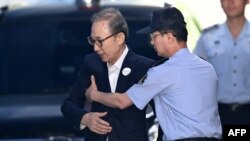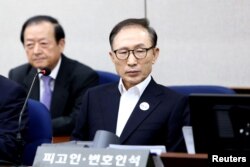Former South Korean President Lee Myung-bak became the fourth leader to receive jail time after leaving office Friday when he was sentenced to 15 years in prison and ordered to pay an almost $11.5 million fine on a range of corruption charges.
Prosecutors had originally sought a sentence of 20 years for his illegal activities.
Impact on corruption
Sogang University political science professor Ha Shang-eung tells VOA that Lee’s sentence will have little impact on the overall awareness level of corruption in South Korea because issues about him were raised before becoming president. Ha also says that because Lee has little influence on the Liberty Korea Party, which was the Saenuri party during his administration, the decision will likely change little within it.
Moreover, Yongin University Graduate School of Education political commentator Choi Chang-ryul adds that while Lee’s sentence punishes anti-democratic behavior, corruption and bribery remain “the most deeply rooted evils of Korean politics.”
Ha asserts that the issue of corruption in South Korea’s politics will not be easy to resolve and identifies two things that must occur.
First, says Ha, serious discussions must be had with the electorate about their responsibilities when they have doubts about a candidate. In addition, voters and the media need to critically evaluate candidates when it comes to corruption allegations. A simple “yes or no” vote without that insight is “unsound.”
Choi postulates it will be necessary to introduce legislation to break down the corrupted system of politics mingling with large business conglomerates. Without it, Choi suspects, a similar situation may arise again and called for meaningful reform of conglomerates, the government, and various public sectors.
South Korean prosecutors alleged Lee took several millions in bribes from Samsung and other companies while in office, as well as embezzling almost $35 million from a company he was involved with.
Lee has denied all wrongdoing and called the case against him “political revenge.” He has been in custody since March 23.
Sentence specifics
In the nearly 90-minute televised trial session, the court ruled that the former president was the de facto owner of his brother’s company, DAS. The court found that Lee had ordered officials there to create slush funds and partake in accounting irregularities. Lee had long been suspected of being the owner of DAS, which was the company at the center of the scandal that led to his imprisonment.
Lee was also found guilty of accepting a $5.85 million payment from Samsung Electronics Company. The court found that the purpose of the funds was to arrange clemency for a tax evasion probe against its chairman, Lee Kun-hee.
The Seoul Central District Court found Lee responsible for only $21.7 million in embezzled funds, citing a lack of evidence from the prosecution for the full $35 million.
Lee was not present in the courtroom Friday when the sentence was read, in protest against the broadcasting of the proceeding on live television.
Lee Ju-hyun contributed to this report.






